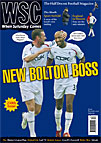 Passion should go out of fashion
Passion should go out of fashion
A genial old man called Stanley Green used to parade up and down Oxford Street wearing a sandwich board, now preserved in the Museum of London, that warned of the dangers of “passion”, which he believed could be brought on by consuming too much protein. The small pamphlets he handed out to passers-by didn’t make any reference to football being afflicted with this dangerous tendency, but the game would have provided him with enough material for a book, possibly even an encyclopaedia.
Leicester supporters interviewed by Sky Sports outside the Walkers Stadium before their first match after Gary Megson’s departure for Bolton in late October were asked who would be their choice as the team’s third manager of the season. One wanted to see someone who “shows passion and commitment”, another followed the same line of thought but was more specific, suggesting that Kevin Keegan would be the best choice.
Everyone who watches football will have a checklist of ills that they would like to see rooted out and dealt with, from bungs and match fixing at one end of the scale to diving and two-footed tackles at the other. But if there is ever to be regulation of any aspect of football practice, let’s deal with “passion” first (in an entirely sober, dispassionate manner, of course). Time and again this “quality” is brought up when candidates for a manager’s job are being discussed, either by chairmen who will be making the decision or by supporters on message boards and phone-ins. Other managers, too, value it as a commodity. When asked who should succeed Sven-Göran Eriksson in 2006, Sir Bobby Robson suggested that it needed to be an Englishman because only he would have “the right fervour from within” – though he was prepared to make an exception for the honorary Anglo-Saxon, Martin O’Neill.
Passion is defined as a “barely controllable emotion” and those managers said to be equipped with it do often appear to be on the edge of reason as they gesticulate, clench their fists, kick over water bottles and berate the fourth official, often in one, almost balletic movement. But somehow the phrase “cool heads needed in a crisis” comes to mind. Players, physically involved and committed, are bound to lose their heads from time to time. Someone needs to keep theirs.
It’s understandable that fans want to believe that players care as much about their team as they do and a few do clearly feel a sense of connection. But it seems extraordinary, in the 21st century and in the face of so much evidence to the contrary, that visible expressions of unhinged emotion are still seen as an important attribute in a manager. José Mourinho’s histrionics were entertaining, but it was his cold calculations that brought in the trophies. Who can forget the image of Alf Ramsey at England’s sole international success, sat almost impassive on the bench while everyone else leapt to their feet around him? Or the sight of Keegan, one of Ramsey’s less adept successors, in his last England game, all passion spent, brain unengaged as the match drifted away?
Graeme Souness’s tea-cup throwing has bounced him out of management and into the right post-playing career, as a pundit, in which role he is surprisingly good – certainly when compared to Sky’s other signing of recent years, Jamie Redknapp. Perhaps it was Souness’s new-found calmness that persuaded Bolton chairman Phil Gartside that Gary Megson was a better choice.
As well as those who swap the bench for the sofa, you can be surprised by people who calm down when they move from playing to managing, such as Roy Keane. Anyone who has worked for someone who shouts all the time learns, gradually, to tune it out. They get on with their jobs and humour the ranting boss as best they can – or else crumble under unrealistic pressure. Keane appears to have learnt from his former boss, Alex Ferguson, that good managers may shout when they feel they must – at Lee Sharpe’s notorious late-night party, for instance – but don’t do it all the time. O’Neill is perpetually in motion on the touchline, but it is his quietly spoken thinking on the game that marks him out. He clearly works to control himself – a recognition that he succeeds despite his emotional engagement, not because of it.
When Ian Wright is struggling to contain himself as a BBC pundit on an England game, who on earth sits there watching and thinks “You know, I reckon he would make a good manager”? A club chairman, probably.
From WSC 250 December 2007